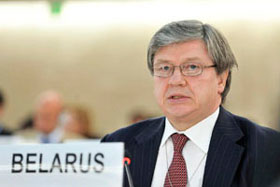Mikhail Khvastou: Belarus does not need a special rapporteur
Belarus does not need a special
rapporteur or any similar institutions. This was stated by the
representative of Belarus to the UN in Geneva Mikhail Khvastou, at a
session of the UN Human Rights Council, where in the evening on June
4 the latest report on Belarus, presented by the special rapporteur
on the situation in Belarus, Miklos Haraszti,was
discussed.
According to Khvastou, the aim of the report is to
exert political and economic pressure on Belarus.
"The
Belarusian nation does not need a special rapporteur. We know what
problems we have and are ready to tackle them", said Khvastou.
"We have our own model, which is based on national sovereignty,
security and rule of law. We reject all allegations contained in the
report, and assert that the conclusions of the report are
unacceptable to us."
In turn, the representative of the
European Union, said: there is no doubt that the report reflects the
systematic violations of human rights in Belarus. She stressed that
the EU is deeply concerned with the continuing violations of the
rights of civil society activists, the pressure on political
opponents, harassment of journalists, as well as the use of the death
penalty.
"We urge the Government to implement all of the
recommendations contained in the report, including the immediate
release of political prisoners, investigate all cases of torture and
unjust sentences and introduce a moratorium on the death penalty,"
said the representative of the EU.
The representative of the
Russian delegation regretted that the report Haraszti is a
"compilation of diverse information from other sources, it is
not the result of communication with the Belarusian authorities."
(Official Minsk refused to cooperate with the Special Rapporteur and
would not let him visit Belarus - BelaPAN). The Russian
representative also said he did not see the need for a special
rapporteur, because the human rights situation in Belarus does not
require special attention.
Representatives of Poland, Germany,
Estonia and France expressed regret that the Belarusian authorities
refused to cooperate with Haraszti, and noted that human rights
violations in Belarus are systemic in nature. They also urged Minsk
to immediately and unconditionally release and rehabilitate all
political prisoners.
The representative of Hungary called on
the Belarusian authorities to immediately release and rehabilitate
all political prisoners, including human rights activist Ales
Bialiatski.
U.S. declared its deep concern about the human
rights situation in Belarus and called for the continuation of the
mandate of the special rapporteur.
Switzerland expressed
concern about the recent passing of death sentences in Belarus and
urged the Belarusian authorities to immediately establish a
moratorium on the death penalty. In addition, the representative of
Switzerland called for the release of political prisoners, including
Ales Bialiatski, Mikalai Statkevich and Dzmitry Dashkevich.
The
representative of the United Kingdom called on Minsk to fulfill the
report's recommendations, to release political prisoners and to
introduce a moratorium on the death penalty.
The
representative of Slovakia said that Belarus exerts pressure on
opposition activists, lawyers and journalists. He called for the
release of political prisoners and expressed regret that the
Belarusian authorities did not allow Miklos Haraszti to visit the
country.
Norway also called on Belarus to release political
prisoners and follow the rest of the recommendations contained in the
report.
The representative of Cuba said that such reports are
used to exert political pressure on the country.
The
representative of Kazakhstan said that the report does not reflect
the position of the official Minsk. He also noted the success of
Belarus in cooperation with various UN agencies.
The
representative of Venezuela called "not to demonize the
Belarusian authorities" and criticized the sanctions imposed on
Belarus by the EU and the U.S..
The representative of China
supported the Russian position on the report and urged the UN Council
on Human Rights to be objective when considering the situation of
human rights in Belarus.
Myanmar has called for dialogue
between the UN Council for Human Rights and the Belarusian
authorities.
The representative of Uzbekistan called the
report biased and said that is unacceptable to call for the release
of political prisoners without a thorough study of the essence of
their criminal cases.
The representative of Palestine said
about politicization and double standards in the Haraszti's
report.
The representative of the human rights organization
"Amnesty International" called on the Belarusian
authorities to introduce an immediate moratorium on the death penalty
and its subsequent cancellation, release political prisoners and to
repeal article 193.1 of the Criminal Code.
The representative
of the Human Rights House Foundation, said that the human rights
situation in Belarus requires a close attention of the HRC. He
stressed that the country still holds 11 political prisoners,
including Ales Bialiatski. "We once again call for their
immediate release, the abolishment of Article 193.1 of the Criminal
Code and putting an end to the persecution of political opponents,
social activists, human rights defenders, journalists," he
said.
The representative of the human rights center "Viasna"
Valiantsin Stefanovich said that the human rights situation in
Belarus remains bad. "There are still political prisoners,
including former presidential candidate Mikalai Statkevich, chairman
of" Viasna "Ales Bialiatski and the leader of the "Young
Front" Dzmitry Dashkevich," he said.
In a final
remark Khvastou thanked the countries which make constructive remarks
and called to a dialogue with Belarus. He reminded the EU of mass
protests in the EU and declared the readiness of the official Minsk
to dialogue on these issues. Khvastou also stressed that Bialiatski,
who was repeatedly mentioned during the debate as a political
prisoner, was convicted for tax evasion.
It is expected that
the consideration of the resolution on the situation in Belarus,
which will make account of the report, will be held on 13-14 June.
The resolution also plans to continue the mandate of the special
rapporteur.


